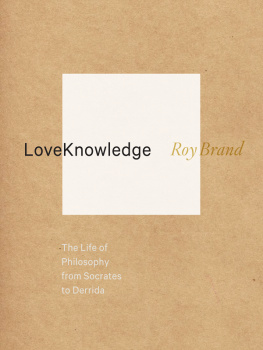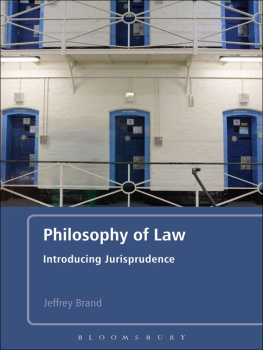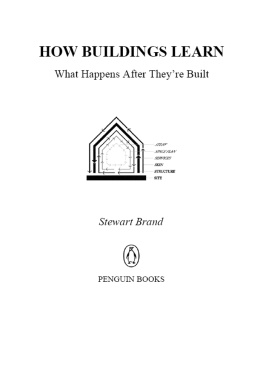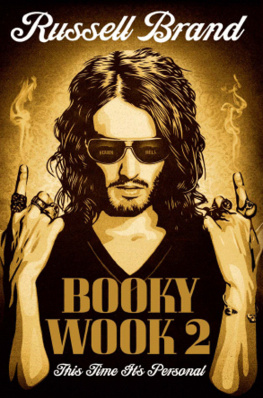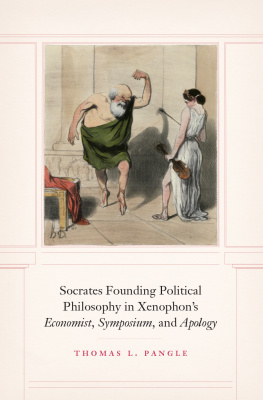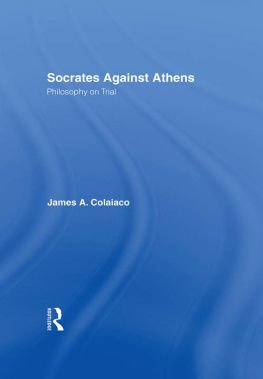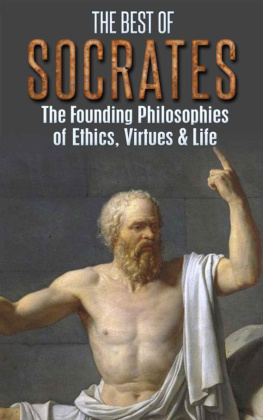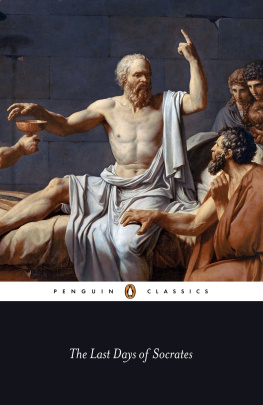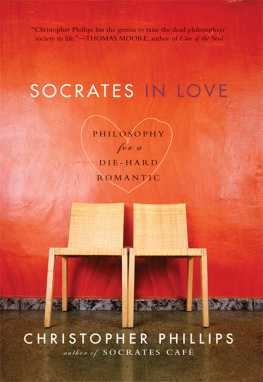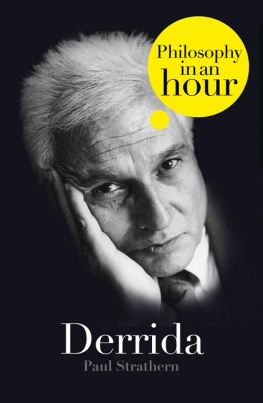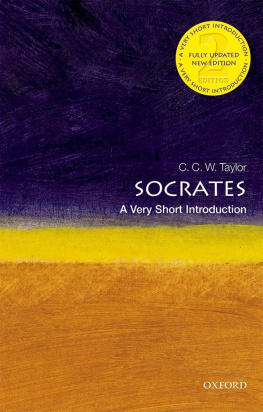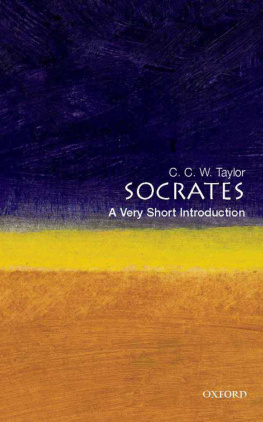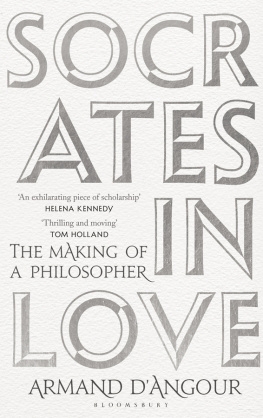LoveKnowledge
Love Knowledge Roy Brand
THE LIFE OF PHILOSOPHY FROM SOCRATES TO DERRIDA
Columbia University Press New York
Columbia University Press
Publishers Since 1893
New York Chichester, West Sussex
cup.columbia.edu
Copyright 2013 Columbia University Press
All rights reserved
E-ISBN 978-0-231-53084-2
Library of Congress Cataloging-in-Publication Data
Brand, Roy.
LoveKnowledge: the life of philosophy from Socrates to Derrida/Roy Brand
p. cm.
Includes bibliographical references (p.) and index.
ISBN 978-0-231-16044-5 (cloth: alk. paper)
ISBN 978-0-231-16045-2 (pbk.: alk. paper)
ISBN 978-0-231-53084-2 (e-book)
1. Life. I. Title. II. Title: Love knowledge.
BD431.B7455 2013
190dc23 2012009205
A Columbia University Press E-book.
CUP would be pleased to hear about your reading experience with this e-book at .
Cover design by Evan Gafney
References to Internet Web sites (URLs) were accurate at the time of writing. Neither the author nor Columbia University Press is responsible for Web sites that may have expired or changed since the book was prepared.
For my parents, Varda and Yoel Brand,
who taught me how to ask without
hesitation and how to answer with
conviction but without certainty.
CONTENTS
All men by nature desire to know.
Aristotle
This book evolved out of years of engagement with key texts and philosophers in academic journals, conferences, conversations, and classroomsboth as a student and as a professor. At times, the book captures the voice of a student or an interlocutor, and at timesthough less oftena professor. In all cases the following pages are the result of close readings or, more concretely, the result of a certain kind of readingone that emphasizes performance and effect and considers these important vehicles for the philosophical message.
The books main concern is expressed in its title: LoveKnowledge. This, of course, is a distortion of the accepted translation of philo-sophia as the love of knowledge. I should confess at the beginning that the book doesnt offer a rigid, conclusive definition. Instead, the term becomes the question that drives each chapter and is reshaped with each new section. For this is how I myself experienced it. Through long and involved readings, I discovered that my thinking comes back to this fundamental question over and over again, from different perspectives: what is the love that turns into knowledge and how is the knowledge we seek already a form of love? I cannot answer this question, and I cannot explain it away. At best, I follow its different formations in a number of texts, which I consider among the best and most interesting of the philosophical offerings. It is the oldest question of them all; this question gave birth to philosophy two and a half millennia ago and this book does not dare an answer but rather attempts to bring it to life for us today.
Each chapter is a reading of a single book. The texts are idiosyncratic, most of them published after each authors death, and they include reflections on the kind of life philosophy offers, the life of the minda term that includes a whole spectrum of activities, from doubting to imagining and desiring. My own reading follows the movement of their thinking, the passion that drives the ideas, and the results. The interpretations I provide are at times informed by other writers, and when this is so I mention it clearly in the body of the text rather than in a note. The goal is not to argue directly with other interpretations or to establish a different systematic interpretation. The interest lies elsewherein discovering what laces different philosophers together, what motivates them, what they achieve, and why it is important for us today. I do not wish to claim that the readings I present here are complete; at best they provide a glimpse of a philosophers thought. But the idiosyncratic perspective can also be beneficial. For the professional, it suggests a fresh way to encounter classical texts and form connections between them. For the novice it serves as an opening into the field of philosophy as a form of life, a practice, or an art of existence.
Though this may sound odd in the context of academic philosophy today, the book should also be entertaining. It often renounces didactic explanations and chooses instead to make the richness and ambiguity of each text come to life. It trusts the impressions of the reader and her ability to navigate a philosophical landscape without an outline or map but with a sense of orientation and know-how. Philosophy is, after all, a practice, and to learn it one must be ready to jump in.
The two things to know about Socrates are that he had nothing definitive to say and that he was ugly. Somehow these two features have been transformed in collective lore into the image of wisdom and beauty. Is it so hard to accept that the founding father of philosophyitself the mother of all the sciencescould be a shabby, unattractive plebeian? Even more interestingly, the transformation of Socrates from mortal rambler to intellectual legend had already begun during his own time. Because he could transform ignorance into a form of wisdom, he could make the unattractive beautiful.
Socrates had nothing to teach, yet is the greatest teacher of them all. How is this possible? The only way to answer this is that the question itself becomes the answer. Socrates is the voice of emptiness, wonder, and doubt that made the philosophical search possible. He is a question mark. Generations of philosophers to comefrom Socrates student Plato to Spinoza, Rousseau, Nietzsche, Foucault, and Derrida, each in his own waycame to inhabit this emptiness. They question, they make us question, live afresh the wonder that is the love of knowledge.
The tradition of unknowingness begins with Socrates. It is a tradition that loves but does not have knowledge, whose love is already knowledge and its knowledge already love. Socrates is the mouthpiece or the mask through which this love story plays out. A reading of two key texts helps explain why this thinkers legacy still matters to us today, two and a half millennia after its birth.
Introduction to Socrates
Socrates (469399 BC) is considered the father of philosophy, though he might have preferred a more maternal title. He described himself at times as a midwife who helped others give birth to their own knowledgea knowledge of themselves. Socrates wasnt the first philosopher, but his predecessorsand the shards of their work that remainfollowed mostly religious or poetic traditions. Socrates and his manner of conversing created the philosophic tradition carried on by his student Plato and by Platos student Aristotle.
Socrates was an Athenian citizen who spent his time in conversations about ethics by asking questions about the good life and the virtues of man. He wrote nothing and claimed that writing is a way of forgetting. Our knowledge of him is restricted to the reports of others: most notably, the dialogues of Plato, the Memorabilia of Xenophon, and The Clouds, a comic play by Aristophanes. He had a profound impact on many of his contemporaries, and, from a distance of two and a half millennia, his portrait remains fresh and his life almost palpable.
Scholars typically divide his work into the early, middle, and late Platonic dialogues. In each dialogue Socrates is the main speaker, guiding its course through a unique method of questioning. In the early dialogues Socrates focuses primarily on ethical problems (such as what is virtue or what is the good) without ever arriving at a positive conclusion that affirms one view or the other. The middle dialogues mark the development of the student, as Socrates student Plato seeks answers to the Socratic questions proposed. The late dialogues represent Platos elaboration, afterthoughts, and even criticism of his own middle period. The first text that concerns us is

